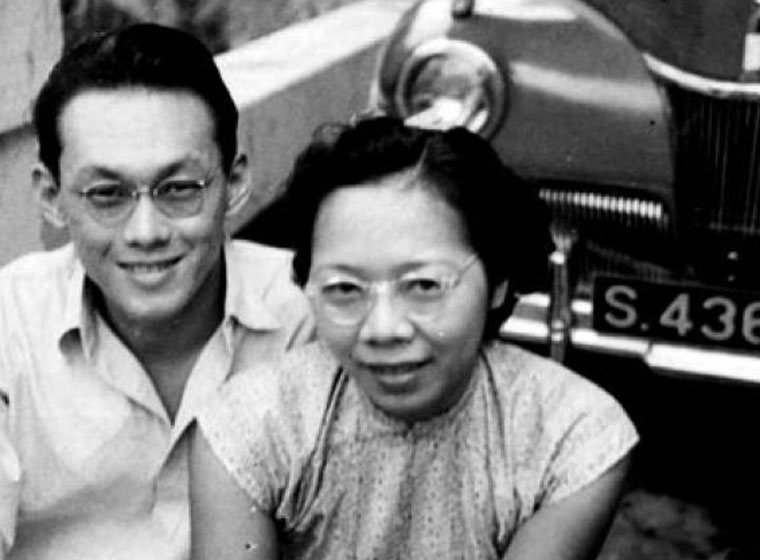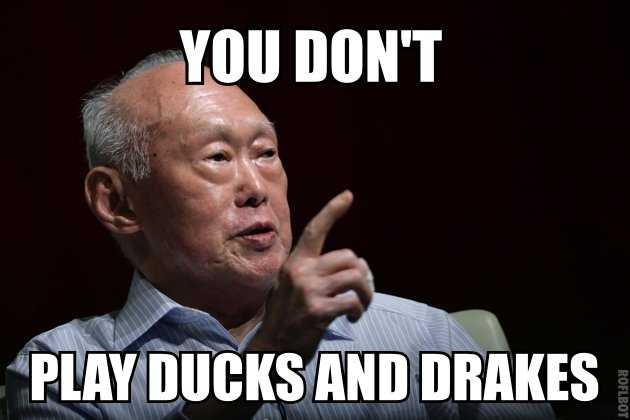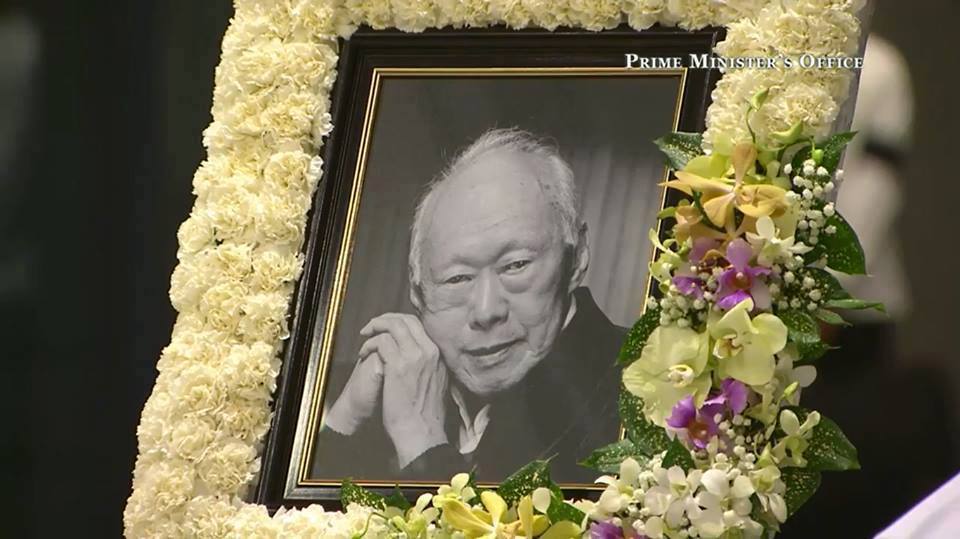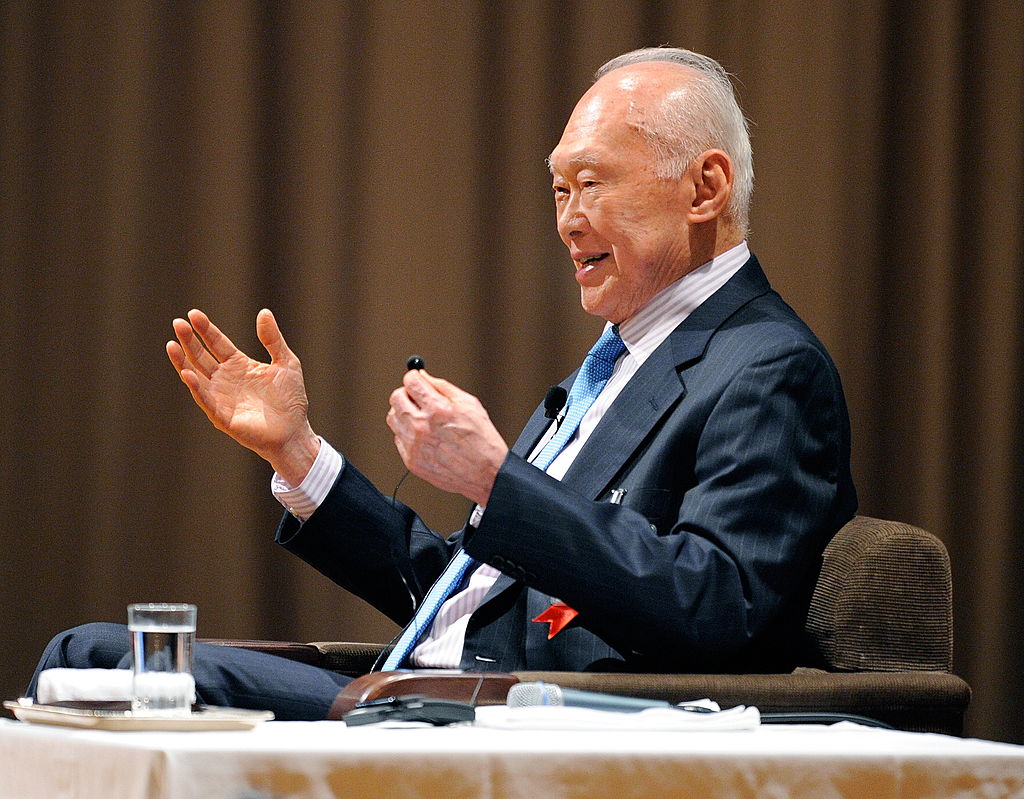We all know that the late founding prime minister Lee Kuan Yew was an extremely quotable man.
There are so many significant, memorable things he has said in the past that it's difficult to whittle them down to 94 quotes — for the age he would have been this year.
On this day, two years on from the day Lee passed away, we'd like to revisit a decidedly uncharacteristic — but also quite poignant and candid — interview he gave to the New York Times' Seth Mydens.
But first, some background on what was happening with him at the time: Lee was still holding his Minister Mentor position. His late wife, Kwa Geok Choo, was by this point bedridden from two strokes she'd suffered two years prior, and would pass away on October 2, 2010, a month after this interview.
Here are seven personal things he opened up about, from it:
1. On nearing the end of life
"When you are coming to 87, you are not that happy," he said at the beginning of their conversation. When Mydens said he should be glad that he has gotten far past where most of us will, he responded, "That is my trouble. So, when is the last leaf falling?"
Lee shared that he meditated about 20 minutes at the end of each day, reciting the Aramaic word "Maranatha", meaning "Come to me, O Lord Jesus", in order to settle himself down for a good night's rest, pushing away the day's pressures and worries.
He indicated also, at this point, that having a religion and believing in something is helpful to attain serenity — for him, as an agnostic, he said he could attain "some composure".
Lee also talked about his ageing ailments and how he tackled them — he swam every day, he cycled or walked every day too, went for physiotherapy once a week, and also learned to use a heat pad on his legs when they were sore.
"I know if I rest I’ll slide downhill fast. No, my whole being has been stimulated by the daily challenge. If I suddenly drop it all, play golf, stroll around, watch the sunset, read novels, that’s downhill. It is the daily challenge, social contacts, meeting people, people like you, you press me, I answer, when I don’t…
It's a constant stimulus to keep alive, and up to date. If I stop it, it's downhill."
2. On his wife's suffering, and how he spent time with her

“She has been for two years bed-ridden, unable to speak after a series of strokes... For just over two years, she has been inert in bed, but still cognitive. She understands when I talk to her, which I do every night. She keeps awake for me; I tell her about my day’s work, read her favourite poems.”
“She was into literature, from Alice in Wonderland, to Adventures with a Looking Glass, to Jane Austen’s Persuasion, Pride and Prejudice, and Sense and Sensibility. Jane Austen was her favourite writer because she wrote elegant and leisurely English prose of the 19th century. The prose flowed beautifully, described the human condition in a graceful way, and rolls off the tongue and in the mind. She enjoyed it. Also Chaucer’s Canterbury Tales. She was an English Literature major.”
“She’s at home. We’ve got a hospital bed and nurses attending to her. We used to share the same room. Now I’m staying in the next room. I have to get used to her groans and grunts when she’s uncomfortable from a dry throat and they pump in a spray moisture called 'Biothene', which soothes her throat, and they suck out phlegm. Because she can’t get up, she can’t breathe fully. The phlegm accumulates in the chest but you can’t suck it out from the chest, you’ve got to wait until she coughs and it goes out to her throat. They suck it out, and she’s relieved. They sit her up and tap her back. It’s very distressing, but that’s life.”
“What to do? What else can I do? I can’t break down. Life has got to go on. I try to busy myself, but from time to time in idle moments, my mind goes back to the happy days we were up and about together...
My daughter’s fished out many old photographs for this piece she wrote... When I look at them, I thought how lucky I was. I had 61 years of happiness.
We’ve got to go sometime, so I’m not sure who’s going first, whether she or me. So I told her, I’ve been looking at the marriage vows of the Christians. The best I read was, 'To love, to hold and to cherish, in sickness and in health, for better or for worse, till death do us part.' I told her I would try and keep you company for as long as I can. She understood.”
“One doctor told me, you may think that when she’s gone you’re relieved but you’ll be sad when she’s gone because there’s still the human being here, there’s still somebody you talk to and she knows what you’re saying and you’ll miss that. Well, I don’t know, I haven’t come to that but I think I’ll probably will because it’s now two years — May, June, July, August, September — two years and four months. It’s become a part of my life.”
3. This funny way he discovered that tea is a diruetic (induces plenty of pee) and switched to warm water:
“Well, I used to drink tea but tea is a diuretic, but I didn’t know that. I used to drink litres of it. In the 1980s, I was having a conference with Zhou Ziyang who was then Secretary-General of the Communist Party in the Great Hall of the People. The Chinese came in and poured more tea and hot water. I was scoffing it down because it kept my throat moistened, my BP was up because more liquid was in me.
Halfway through, I said please stop. I’m dashing off. I had to relieve myself. Then my doctors said don’t you know that tea is a diuretic? I don’t like coffee, it gives me a sour stomach, so okay, let’s switch to water.”
4. The link he drew between taking racial harmony for granted, opening up the political marketplace and likely failure in that event:
Many young Singaporeans are likely feel Lee was repeating himself like a broken record, in stressing the importance of preserving racial harmony and equality in treatment among races.
“... there’s such a narrow base to build this enormous edifice, so I’ve got to tell the next generation, please do not take for granted what’s been built. If you forget that this is a small island which we are built upon and reach a 100 storeys high tower block and may go up to 150 if you are wise. But if you believe that it’s permanent, it will come tumbling down and you will never get a second chance...
Because you play it that way, if you have dissension, if you chose the easy way to Muslim votes and switch to racial politics, this society is finished. The easiest way to get majority vote is vote for me, we’re Chinese, they’re Indians, they’re Malays. Our society will be ripped apart. If you do not have a cohesive society, you cannot make progress...
I believe they (young people) have come to believe that this (our racial stability) is a natural state of affairs, and they can take liberties with it. They think you can put it on auto-pilot. I know that is never so...
(His views on policies changing after he passes on) No, you can go looser where it’s not race, language and religion because those are deeply gut issues and it will surface the moment you start playing on them. It’s inevitable, but on other areas, policies, right or wrong, disparity of opportunities, rich and poor, well go ahead. But don’t play race, language, religion. We’ve got here, we’ve become cohesive, keep it that way. (emphasis ours)”
5. In defence of his toughness and defamation suits:

“Yes, of course. I had to fight left-wingers, Communists, pro-Communist groups who had killer squads. If I didn’t have the guts and the gumption to take them on, there wouldn’t be the Singapore. They would have taken over and it would have collapsed. I also had to fight the Malay Ultras when we were in Malaysia for two years.”
“I’m not saying that everything I did was right, but everything I did was for an honourable purpose. I had to do some nasty things, locking fellows up without trial... because otherwise they are running around and causing havoc playing on Chinese language and culture, and accusing me of destroying Chinese education.
You’ve not been here when the Communists were running around. They do not believe in the democratic process. They don’t believe in one man, one vote. They believe in one bullet, one vote. They had killer squads. But they at the same time had a united front exploiting the democratic game. It gave them cover. But my business, my job was to make sure that they did not succeed. Sometimes you just got to lock the leaders up. They are confusing the people.
The reality is that if you allow these people to work up animosity against the government because it’s keeping down the Chinese language, because we’ve promoted English, keeping down Chinese culture because you have allowed English literature, and we suppress our Chinese values and the Chinese language, the Chinese press, well, you will break up the society. They harp on these things when they know they are not true. They know that if you actually do in Chinese language and culture, the Chinese will riot and the society must break up.”
“We are non-corrupt. We lead modest lives, so it’s difficult to malign us. What’s the easy way to get a leader down? He’s a hypocrite, he is corrupt, he pretends to be this when in fact he’s that. That’s what they’re trying to do to me. Well, prove it, if what you say is right, then I don’t deserve this reputation. Why must you say these things without foundation? I’m taking you to court, you’ve made these allegations, I’m open to your cross-examination.
No, you’re fearful of a libel suit? Then don’t issue these defamatory statements or make them where you have no basis. The Western correspondent, especially those who hop in and hop out got to find something to show that they are impartial, that they’re not just taken in by the Singapore growth story. They say we keep down the opposition, how? Libel suits. Absolute rubbish. We have opponents in Parliament who have attacked us on policy, no libel suits against them and even in Parliament they are privileged to make defamatory allegation and cannot be sued. But they don’t. They know it is not true. (emphasis ours)”
6. On laughing at himself, and what made him laugh:
“Many things, the absurdity of it, many things in life. Sometimes, I meet witty people, have conversations, they make sharp remarks, I laugh... Life as a whole has many abnormalities, of course.”
“That’s very frequent (times when he laughs at himself). Yeah, I’m reaching 87, trying to keep fit, presenting a vigorous figure and it’s an effort and is it worth the effort? I laugh at myself trying to keep a bold front. It’s become my habit. I just carry on.”
7. On his legacy:

“Let me give you a Chinese proverb 'Do not judge a man until you’ve closed his coffin.' Do not judge a man. Close the coffin, then decide. Then you assess him. I may still do something foolish before the lid is closed on me.
No, the final verdict will not be in the obituaries. The final verdict will be when the PhD students dig out the archives, read my old papers, assess what my enemies have said, sift the evidence and seek the truth.”
You can read the entire transcript of the interview here.
More things to read on LKY's 2nd death anniversary:
94 quotes from Lee Kuan Yew that show why you either miss him or have already forgotten about him
Here are videos of Lee Kuan Yew in his prime shared on his 2nd death anniversary
Top photo by TORU YAMANAKA/AFP/Getty Images
If you like what you read, follow us on Facebook and Twitter to get the latest updates.
If you like what you read, follow us on Facebook, Instagram, Twitter and Telegram to get the latest updates.
